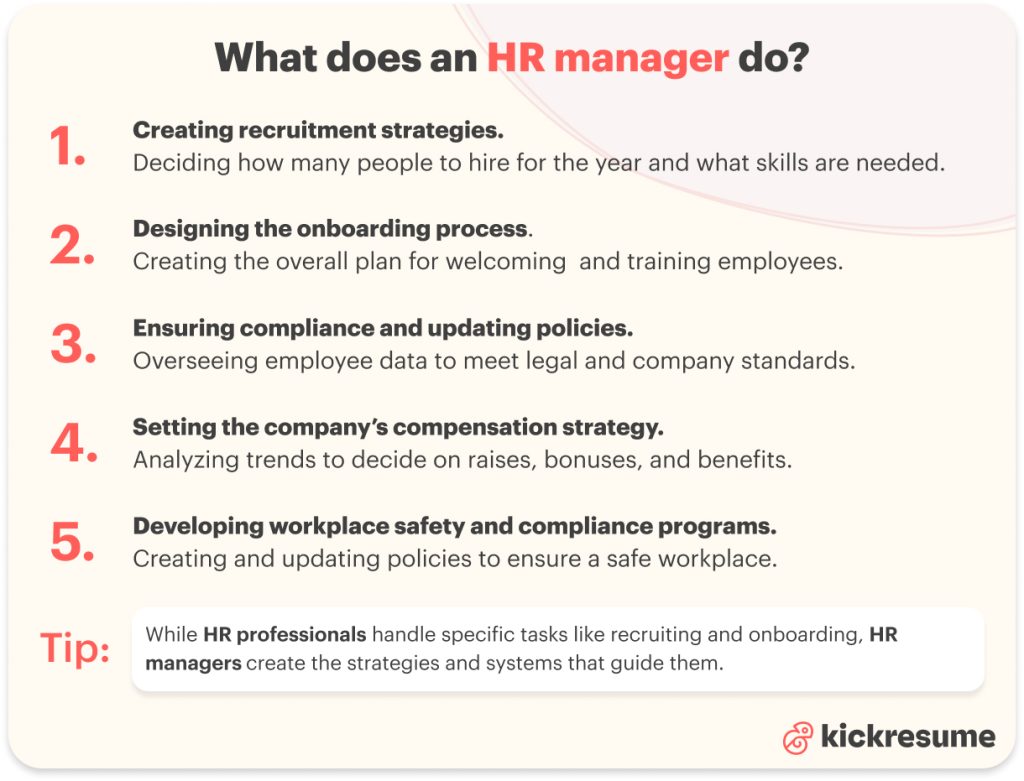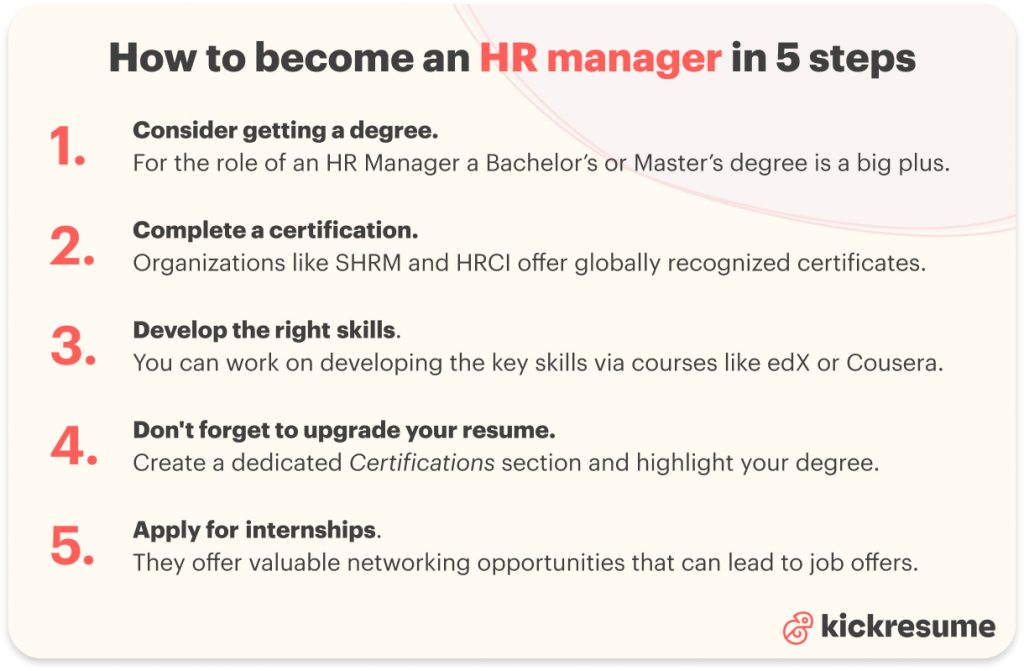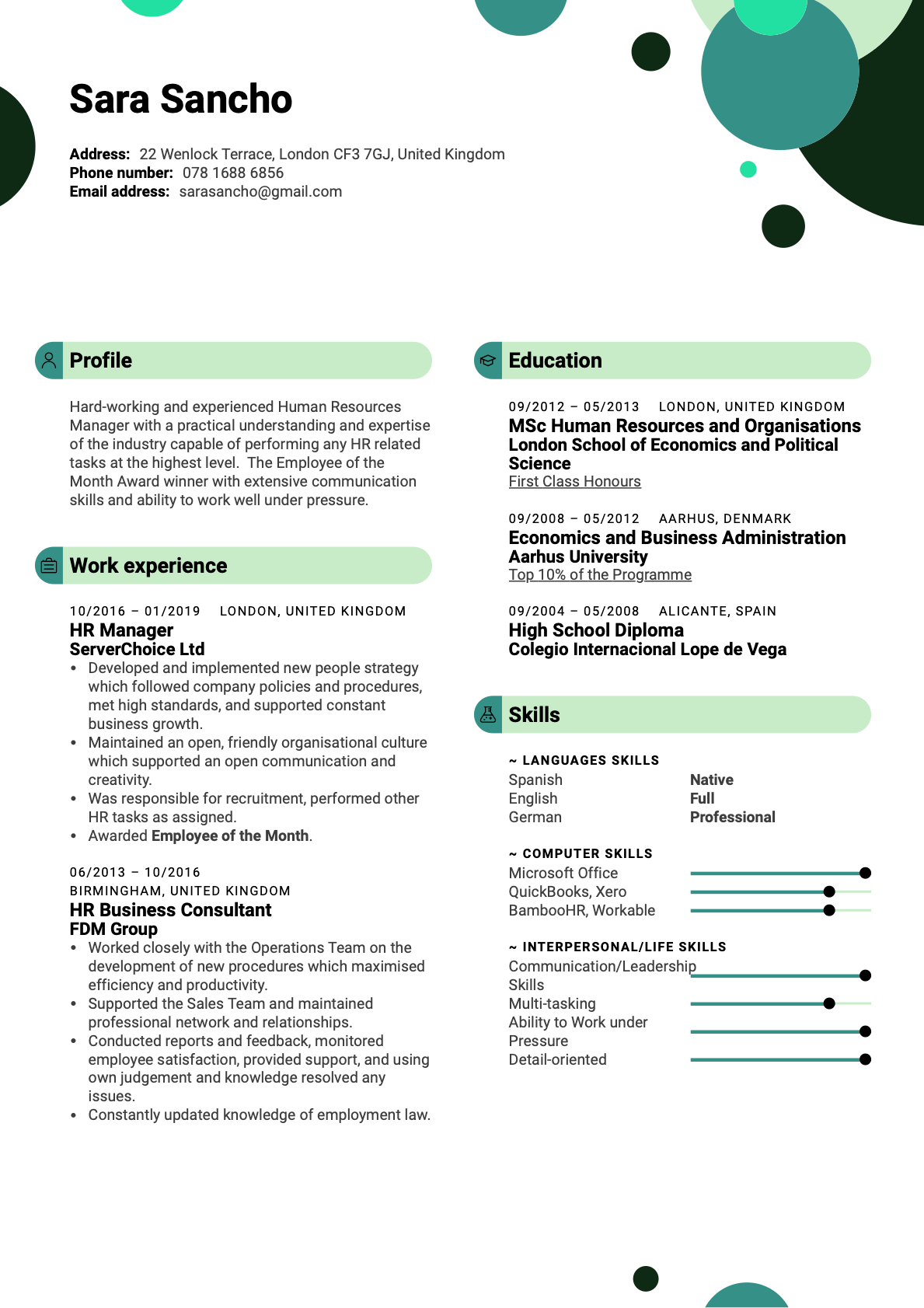If you're wondering how to become an HR manager, now is the perfect time to pursue this career.
The demand for qualified HR professionals is on the rise, with projected to growth of 6 percent from 2023 to 2033, according to the U.S. Bureau of Labor Statistics.
This translates to roughly 17,400 new job openings for HR managers each year over the next decade.
So, why is the demand so high? Well, nearly every company relies on HR professionals to manage their workforce and support their employees.
As new businesses emerge and existing ones thrive, the growing number of employees means a greater need for HR professionals to keep operations running smoothly.
Lucky for you, getting into HR isn't overly complicated—you just need to follow a few key steps to get started.
What does HR do?
If you've ever watched The Office, you know that HR sometimes gets a bad rep.
Many people think of HR as a department with little responsibility beyond acting in the company's best interest and managing piles of administrative paperwork.
But let's set the record straight and take a look at what HR professionals actually do. Spoiler: They're busy people!
Their duties include:
- Recruiting new employees. Part of recruitment is candidate screening, selection, organizing interviews, and contacting candidates to arrange interviews.
- Onboarding of new employees. That includes administration, setting up accounts, and creating presentations and courses for new employees.
- Administration. Keeping track of documents, and employee data like vacations, medical leave, and checking attendance.
- Compensation and benefits. Making sure the employees receive the correct salary and access the benefits that many times also involve health insurance and retirement plans.
- Ensuring a safe working environment for everyone. HR maintains open communication with employees, addresses their concerns, ensures the company follows labor laws and handles any issues related to workplace safety or legal compliance.
The specific tasks and responsibilities of HR can vary depending on the role, the company, and the level of education required for the position.

What does an HR manager do?
While HR professionals handle the specialized day-to-day tasks, HR managers are in charge of the whole HR department, ensuring its smooth operation.
HR managers also make strategic decisions about how HR can support the company's overall goals. Their focus is broader, covering the entire HR department.
Main tasks of HR managers:
- Creating recruitment strategies. Deciding how many people to hire for the year and what skills are needed. They also collaborate with department heads to identify staffing needs and plan hiring timelines.
- Designing the onboarding process. HR managers create the overall plan for how new employees will be welcomed and trained. They make sure the process helps new hires get familiar with the company culture and their role.
- Ensuring compliance and updating policies. HR managers regularly review and update policies related to attendance, medical leave, and employee data to ensure everything is in line with legal standards and company needs.
- Setting the company’s compensation strategy. HR managers decide what salary ranges and benefits the company will offer to stay competitive in the market. They analyze trends and make decisions about raises, bonuses, and benefits packages.
- Developing workplace safety and compliance programs. HR managers create and update policies to make sure the workplace is safe and follows all legal requirements. They also oversee programs that train employees on safety and handle any legal issues that arise.
How to get a job in HR?
The truth is, that when it comes to how to get a job in HR—there's no straightforward answer. That's because it's a broad industry with many roles and specializations to choose from.
- For more senior roles (like an HR manager), you might need specific certifications or even a college degree to be considered. (We'll cover those later in the article.)
- For other roles, especially entry-level roles, you don't necessarily need any certifications, or prior experience.
But a good starting point for how to get a job in HR (regardless of the level of experience) is to work on developing soft and hard skills necessary for ALL roles in HR.
In a nutshell, though, to get a job in HR, you should consider getting a degree, a certification, and developing relevant skills. However, it depends on the role and your prior experience.
Common HR jobs
A lot of people aren't sure how different HR jobs compare and think they all do the same thing.
That’s why we’ve put together a list of the most common HR roles and what their responsibilities are.
This will help you figure out which one interests you the most and what skills you’ll need to focus on.
Here are some of the common HR job roles:
- Human resources manager. HR managers are in charge of the whole HR department. They ensure the whole team works efficiently. They plan hiring strategies and handle exit interviews and other sensitive employee matters.
- HR Specialist. Makes sure the company and HR department run smoothly by handling employee communication and helping with organizational development.
- Recruiter. The main job of a recruiter is to find the best candidates for specific roles. They post job ads online, review applications, reach out to applicants, and handle salary negotiations.
- Employee relations manager. Helps to create a positive and productive workplace for employees.They also manage the relationship between the company and its employees.
- Labor relation specialist. Their expertise is in economics, labor laws, and wages. They gather data for managers, handle employee complaints, set up labor relations programs, and provide advice to the HR department.
HR entry-level jobs
- Compensation analyst
- HR Intern
- HR assistant
- Recruitment coordinator
- HR coordinator
How to become an HR manager in 5 steps
From getting the right education, obtaining a recognized certification to developing the right skills—it's a lot! But we made it easy for you.
Here's how to become an HR Manager in 5 steps:
- Consider getting a degree.
To pursue a career as an HR manager, having a degree is often required, and even when it's not mandatory, it can be a big advantage. While a degree in Human Resources is ideal, other related fields such as Business Management, Labor Relations, or Psychology can also pave the way for a successful HR career.
- Complete a certification.
Certifications are a great way to prove your skills and boost your credibility. Unlike a degree, they take less time—anywhere from just 2 to 12 months. There are a 2 organizations which offer globally recognized certifications within the industry: Society for Human Resource Management (SHRM) and Human Resources Certification Institute (HRCI).
- Develop the right skills.
Hard skills include administrative expertise, financial knowledge, and a solid understanding of employment law. Tools like A Strategic Human Resource Planning Guide can help align these skills with organizational needs. And try to remember, soft skills such as effective communication and problem-solving abilities are also equally important.
- Don't forget to upgrade your resume.
When writing an HR resume, start by creating a dedicated "Certifications" section and highlight your degrees. Include a brief summary of your HR experience, and use HR-related keywords in the work experience section. Finally, be sure to mention key HR-specific skills to showcase your expertise.
- Apply for internships.
If you don’t have enough experience and want to get started, a good first step is to look for internships or entry-level positions right after graduation. This will help you get familiar with the industry, and could even lead to a job offer in HR down the line. Look at sites such as Indeed, or LinkedIn.
Now, let's take a closer look at each of the 5 steps.

Step 1: Consider getting a degree
When people think about starting their career in HR, they usually ask: Do I have to have a degree to start working in HR? This question doesn’t have a straightforward answer.
Technically, you don’t need a degree to work in HR—it really depends on the role you're aiming for. For entry-level positions, a college degree isn’t always necessary.
However, if you're interested in more senior roles (like an HR manager), having a higher level of education in a related field can be a big advantage, especially if you plan to grow and build a long-term career in HR.
There are three types of degrees you can get when you want to work in HR, each suited to different career paths and levels within the field:
- Associate Degree (2 years). This is ideal for entry-level roles.
- Bachelor’s Degree (4 years): For those looking to enter mid-level HR roles
- Master’s Degree (1-2 years, after completing a bachelor’s degree). Typically required for higher-level positions like HR manager. You might want to take a look at this full list of 41 accredited online master’s in human resources programs.
If you want to get into HR, the program you’ll want to apply for is obviously called Human Resources.
However, if you want to keep your options open there are other related degrees that can also lead to an HR career:
- Organizational Psychology
- Business Management
- Labor Relations
- Business Administration
Step 2: Complete a certification
Besides getting a degree, you can also level up your knowledge with certifications that HR professionals value and are proof of your specific skills.
Certifications can boost your chances and credibility and open up more doors in the HR job market, and the best part is they take way less time than a degree—usually just 2 to 12 months to finish.
They also offer various specializations, including payroll processing, which is a crucial and often complex aspect of HR.
There are a couple of organizations which offer globally recognized certifications within the industry:
- Society for Human Resource Management (SHRM). They offer two types of certifications: SHRM-CP (Certified Professional) for which you do not need prior experience, and SHRM-SCP (Senior Certified Professional), which is suited for people who do strategic-level HR-related work—a.k.a. HR Managers. These two certifications are recognized and valued by employers in all industries as the premier human resources certifications.
- Human Resources Certification Institute (HRCI). You can choose from 8 types of certifications for local and global participants based on their geographical location and career level. The main difference between SHRM and HRCI certifications is that HRCI requires you to have industry experience to sit for the exam.
Also, check out these HR online courses:
- Preparing to Manage HR (Coursera and University of Minnesota)
- Onboarding New Hires as a Manager (LinkedIn Learning)
- Human Resource Management: HR for People Managers Specialization (Coursera)
Step 3: Develop the right skills
To succeed in your job and be a valuable part of any company, you need to develop the right skills and be prepared for the challenges of working in HR.
This includes hard skills for understanding HR strategies and tools, but since HR managers often handle difficult and sensitive conversations, it's equally important to develop soft skills to navigate these situations effectively.
Now, let's take a look at the key soft and hard skills you need for all HR roles, especially if you aim to become an HR manager.
- Soft skills: Communication skills, leadership, problem-solving, conflict resolution, coaching, negotiation
- Hard skills: Administrative expertise, recruitment, knowledge of Human Resource Information Systems (HRIS), HR Strategy, finance skills, employment law, analytical thinking
Apart from HR certificates, you can work on these skills by doing a course at Coursera or edX.
Step 4: Don't forget to upgrade your resume
Every great job starts with a great resume, and becoming an HR manager is no different.
We’ve put together some specific tips for an HR resume to help you create one that stands out.
Specific resume tips for HR managers:
- Create a dedicated Certifications section. Certifications demonstrate your skills and knowledge, create a Certifications section where you can go into more detail about what you've learned and how it applies to the role you are applying for.
- Highlight your HR degrees in Education. Don't forget to highlight your education and degrees. If you have a specific course and they're relevant to the job, briefly describe what you learned and how it applies to the role you're applying for.
- Feature your HR experience in the Resume summary. If you have HR experience, a great way to showcase it, besides listing it in the Work experience section, is to include it in your resume summary. This highlights your experience right away and increases the chances of catching a recruiter's attention.
- Use HR related keywords throughout the resume. When describing your work experience, try to use HR-related keywords. Some companies may use ATS systems which scan resumes for specific keywords. This will make sure your resume isn't discarded.
- Include HR specific hard & soft skills. When creating a Skills section, focus on HR-specific skills like knowledge of HRIS, administrative expertise, employment law, problem-solving skills, etc.
Later in the article we'll show you 3 HR resume examples belonging to real HR professionals that are active in the industry.
Step 5: Apply for internships
If you have the chance to take an internship as part of your degree jump on it (trust us, it will pay off so, so much)! Companies often look for interns during spring time to hire for the summer.
The ideal place to look is on your college’s career website or established sites such as Indeed, or LinkedIn.
After graduation look for a more junior position as an HR intern or an HR assistant (or something similar). This will build your skills further and after a year or two, you’ll learn the ropes of HR work.
If you have a non-HR bachelor's degree, expect to work in junior positions longer so you can catch up with your peers with human resources qualifications.
The average US salary for a Human Resources intern is around $44,532 per year, according to Glassdoor. Not a bad starting point.
How long does it take to become an HR manager?
The time it takes to become an HR manager depends on where you start and how ambitious you are.
If you already have some HR experience—in that case, it might just take a few months. But if you're new to HR and don't have any experience, that's a different story.
Why? Most HR managers need a degree or at least a certification. A bachelor's degree takes about 4 years, and a master’s degree usually adds another 2 years.
Certificates, however, are quicker, typically taking anywhere from 2 to 12 months, depending on the one you choose.
Since being an HR manager isn’t an entry-level role, you’ll need at least a few years of experience. But, to get there you can start by applying for internships or entry-level HR jobs to build that experience. Either way, it’ll take a few years.
HR manager salary
As we already mentioned, the HR industry is currently in high demand–and will likely continue to be.
But still, the salary can differ depending on a number of factors like the size of the company, your experience and expertise, and of course location.
But still, we can provide a range and an average salary.
So, how much does an HR manager make? The salary of an HR manager in the US moves from $81k – $134k per year. The average salary for a Human Resources Manager is $103,610 per year in United States.
Ultimately, while salaries can vary, pursuing a career as an HR manager offers solid earning potential and the opportunity to grow.
HR resume examples
We've covered how you should write your resume to stand out in the HR world, but since we know one picture speaks a thousand words, let's look at 3 HR resume examples.
HR Operations Manager resume example
If you want to save time when crafting your resume, try using our AI resume writer tool, that will write a strong resume for you.
Key takeaways: How to become an HR manager?
HR is a high-demand and growing industry with plenty of growth opportunities.
And, if you wonder how to become an HR manager, here’s a list of things you should think about doing before you kickstart your career.
We've outlined 5 simple steps to set you on the path toward a successful career in HR or becoming an HR manager.
Here are the 5 steps to get you started:
- Consider getting a degree
- Complete a certification
- Develop the right skills
- Don't forget to upgrade your resume
- Apply for internships
Following these steps is a great foundation for becoming an HR manager, but bear in mind that it can be a long process, and it won't happen overnight.
And in case you've realized that being an HR manager isn't the right choice for you after reading this article, you can explore some other options:
- How to Become a Real Estate Agent: Licenses, Exams & More
- How to Become a Psychologist: Degrees, Specializations and More
- How to Become a Chiropractor: Degrees, Courses & More (+Resume Example)
FAQ: How to become an HR manager?
FAQ: How to become an HR manager?
- What skills does a good HR manager need?
Now, let’s see what skills and qualities you need to succeed as an HR manager.
First things first, you need to be comfortable with working with people and embrace workplace diversity with an open mind. A key skill to work on is, unsurprisingly, communication. As an HR manager you will need to feel comfortable with addressing various, sometimes unpleasant, issues.
In a managerial position, you need to be a strong leader who is not afraid to make decisions and take responsibility.
Some of these skills you will learn and practice while studying for a human resources degree. Some are personal qualities which you will gain through life experience.
To help you figure out what skills to highlight, here are some brilliant human resources resume examples created by our happy customers. Don’t worry, we didn’t forget about human resources cover letter examples either.
- What are the salary expectations for HR management positions?
As an HR manager, you can expect a salary that fits your educational background and experience. The average salary for a Human Resources Manager is $103,610 per year in United States, based on Glassdoor data.
- Can you get into the field without a human resources degree?
While an HR-focused degree is definitely a good choice, it might still be possible to get the position of an HR manager without it.
Just a heads up—it will likely be difficult. The industry standard is to have a bachelor’s degree, whether an HR one or otherwise. But with the right company, you might work your way up the ladder and after obtaining enough experience become a HR manager.
Focus on building your communication and analytical skills. It is always an option to get a degree later in your career in order to progress further. An online or part-time degree could be the right choice for you in this case.
- Can I study online?
Studying and working online is definitely an option. In the US (and abroad) many universities offer fully online human resources degrees. An online degree will prepare you for your career in a similar way to an in-person program would.
Completing your degree online might also save you some money in the long run. For example, Florida International University offers an affordable “Bachelor of Business Administration in Human Resource Management” degree starting at $4721. What a bargain!
- Should I get a PhD?
Pursuing a highly specialized, research-heavy doctorate might seem like a daunting task. But if you feel passionate about the field and have a specific topic in mind that you won’t mind spending 3-6 years on, go for it.
A PhD in human resources will be an excellent way to deepen your knowledge of the field. If you’d like to give it a try, here’s a list of the best US human resources PhDs.
Having a doctorate in HR will progress your career significantly and will come with a tasty bump up in salary. PhD in human resources will likely ensure you reach an even higher position.
However, if academia is not your thing, there is no pressure on getting a PhD. Think of it more as a passion project with added benefits. It’s definitely not a requirement for a successful career in human resources.







